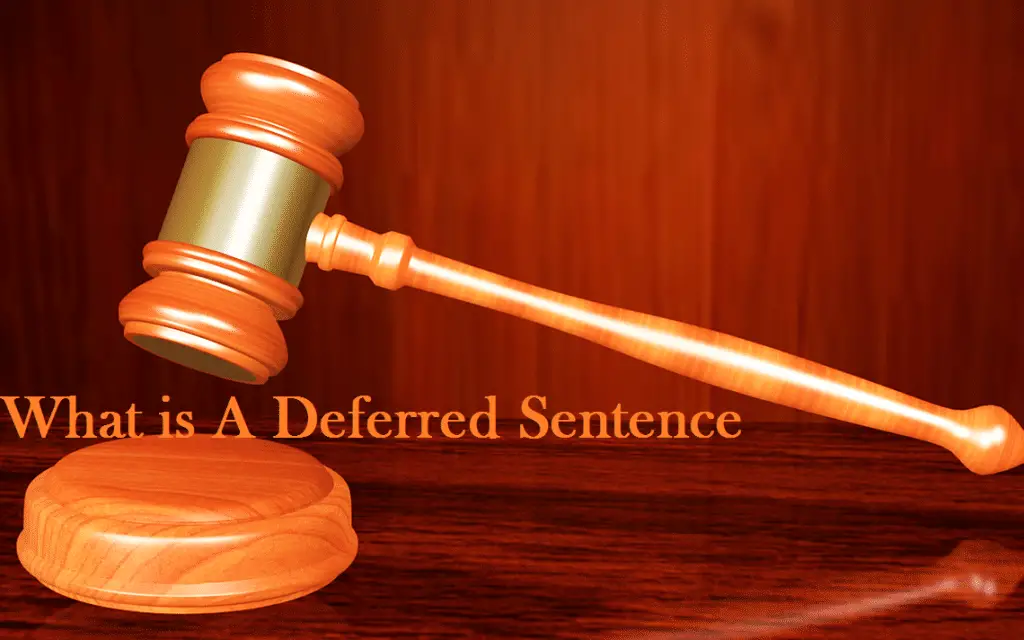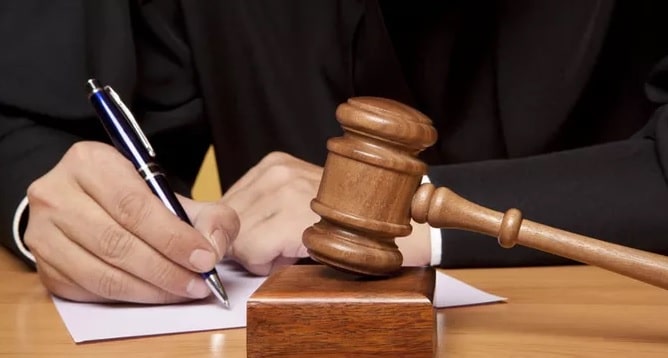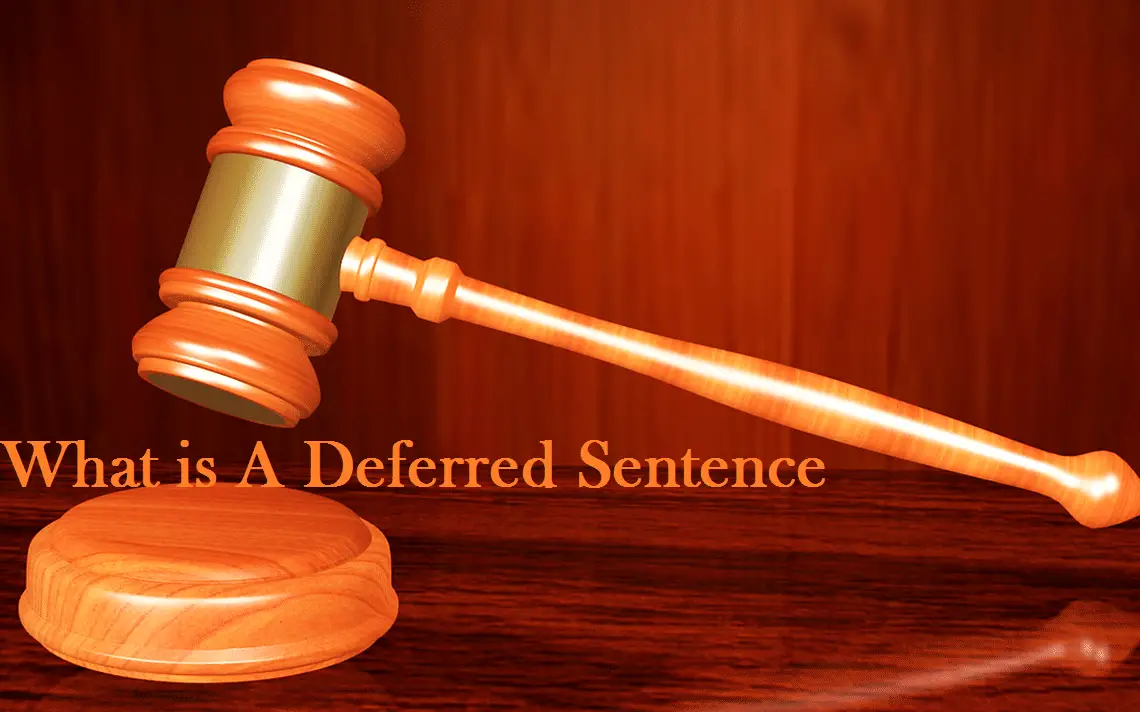A felony usually comes with a long prison term. A broad range of sentences can be given to offenders.
First-time offenders, sometimes, are presented with a deferred sentence option in place of a ‘no contest’ or ‘guilty plea.’
In this article, you’d find out the following:
- The meaning and types of sentences, how to obtain a deferred sentence.
- Whether or not a deferred sentence would appear on a background check
- The implication to felony convicts
- Running a background check on yourself
What Does Deferred Sentence Mean?

After a suspect is charged to court for a criminal offense, the case is prepared by the prosecutor and defense – trailed by a court trial.
If the accused is found guilty at the end of the trial, the judge makes a sentence. In making sentences, judges are guided by a standard criminal sentencing rule as spelled out in the constitution.
Primarily, sentences are designed to fulfill these objectives:
- Curb crime rate
- Punish the perpetrator
- Rehabilitate criminals
- Protect residence
According to Wikipedia “A deferred sentence is a sentence that is suspended until after a defendant has completed a period of probation.”
Types of Sentences
Several sentences can be given by the judge when suspects are pronounced guilty, including;
- Indeterminate sentence – here is an open-ended sentence. It is usually in given with years’ range
- Determinate sentence – unlike determinate sentence, this type of sentence is given for a specific time.
- Concurrent sentence – this entails different sentences served a person at the same time
- Consecutive sentences – this is where several crimes are combined, and a single sentence served
- Suspended sentence – here, sentence enforcement is postponed for a period
- Deferred Sentence – Deferred sentence involves the postponement of sentence execution until certain conditions are satisfied.
An In-depth Look at Deferred Sentence
A deferred sentence offers a defendant an opportunity to meet certain provisions and avoid a prison sentence. Here’s a more detailed look at what a deferred sentence entails:
- The law court offers an offender the opportunity to complete a probationary duration before the judge passes down a punishment
- Where the defendant completes the probation and meets certain demands, the court reviews the case file. If satisfied, the offender’s charges are dismissed.
- Where the defendant fails to meet all the stipulated terms, as outlined by the court, conviction is instated and punishment handed down.
- Most importantly, a deferred sentence offers you an opportunity to satisfy the terms stated by the court. If completed, an offender may not be convicted, and such records may not appear on your records. The conditions, however, vary across jurisdictions.
Here are some common conditions
- Community service
- Court fine and costs
- Alcohol and drug law screenings
- Crime free within probationary period.
After the conditions are satisfied and the case dismissed, the case will no longer appear on the defendant’s records. And of course, to employers or property managers, there were no convictions.
After probation completion and charges dismissal, a public record or charges, the arrest, and proceedings will reflect on a public record. After observing a deferred sentence, offenders are granted a partial expungement. This means their charges are wiped from their criminal record.
Felons will be eligible for a complete 10-year expungement from the date of deferred sentence completion. A full expungement may come a year after a misdemeanor.
Following successful completion of a deferred sentence, the case is dismissed. After the dismissal, the judge may bring down the sentence as well as the guilty plea. After throwing out the sentence and plea, a civil petition is filed to remove the case records from public record.
Where a deferred sentence is violated by a failure to satisfy the probation terms, it becomes an incarceration term which typically takes the length of the initial sentence.
Will A Deferred Sentence Show up on a Background Check?
During job application, the employer views credit reports, educational records, driving records, as well as criminal offenses. Such historical records give hiring managers a peep into a candidate’s past live, mistakes, financial status, character, etc.
These checks help the hiring company identify the risks associated with hiring a potential employee, considering the overall safety of their organization.
Review of criminal records of a background check involves examination of criminal history files which shows all criminal offenses – both convictions and no conviction – as well as cases dismissed or not prosecuted.
While convictions can show up on your report without any time limit, non-convictions are reported for seven years. However, when a felon’s records are expunged, it will not reflect on their background check.
Since there must be a conviction before a deferred sentence is granted, the crime committed will reflect on the background check – but during the probation duration. After successful completion of probation, a deferred sentence is wiped off a background check.
That said, the initial arrest and charges will still show up on the record, and of course, the background check.
What A Deferred Sentence Means for Felons

To felons, a deferred sentence presents an opportunity to dismiss their convictions – after satisfying all the probation terms. However, to be eligible for this type of sentence, the accused must opt for either ‘no contest’ or ‘guilty plea.’
These pleas establish a conviction record which sticks to a felon, pending when he satisfies all terms given by the court. This can go a long way to determine whether or not you get a job – or an apartment.
An accused may remain guilty if he does not obtain a plea bargain with a deferred sentence. Consult an attorney for professional guidance.
A primary advantage of obtaining a deferred sentence is that the case is considered dismissed after probation.
For such dismissed cases, an employer will do information gathering, to ascertain whether or not the defendant was guilty of the charges. However, this is very rare, as most employers will overlook a dismissed charge.
That said, an expunged record is the best deal, as it completely conceals your criminate records.
Can you run a Background Check on yourself?
Of course, yes. A self background check helps felons figure exactly what public records say about them. It allows such applicants to see what their employers or landlord would see when they conduct background checks on them before considering them for employment or tenancy.
If you have a felony record, you may consult your attorney for guidance. It is, however, safer to be proactive and know what your records say so that you’re not surprised with your background check.
If you wish to run a background check on yourself, particularly when involving a deferred sentence, there are a lot of online resources that can help.
Where your bad records show up, honesty is key. Come out plain about your deferred sentence. If you lie, you can ruin your chances when/if the truth is found.
Be bold enough to take responsibility for your past mistakes and dwell on the lessons you learned and how much you’ve moved past your past.

